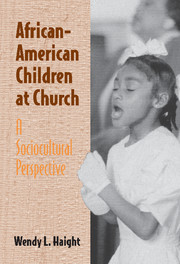Book contents
- Frontmatter
- Contents
- List of Tables
- Acknowledgments
- PART ONE OVERVIEW
- 1 Introduction
- 2 The African-American Church and the Socialization of Children's Resiliency
- 3 Research Strategy
- PART TWO PATTERNS OF SOCIALIZATION AND PARTICIPATION
- PART THREE RELATIONSHIPS OF RESEARCH AND PRACTICE
- PART FOUR CONCLUSION
- References
- Index
3 - Research Strategy
Published online by Cambridge University Press: 10 August 2009
- Frontmatter
- Contents
- List of Tables
- Acknowledgments
- PART ONE OVERVIEW
- 1 Introduction
- 2 The African-American Church and the Socialization of Children's Resiliency
- 3 Research Strategy
- PART TWO PATTERNS OF SOCIALIZATION AND PARTICIPATION
- PART THREE RELATIONSHIPS OF RESEARCH AND PRACTICE
- PART FOUR CONCLUSION
- References
- Index
Summary
As everyone knows, in science, as in life, two hands (measuring and interpreting, abstracting and exemplifying) are usually better than one.
Shweder, 1996The research strategy employed in this study reflects an emerging interest in the integration of developmental and ethnographic methods. The intent of such methodological pluralism is to strengthen both developmental and ethnographic approaches in order to better understand development in a variety of sociocultural contexts (see Jessor, Colby & Shweder, 1996), including African-American communities (e.g., Heath, 1996). Developmental methods include the systematic, often microscopic, description of children's participation in everyday activities and changes in participation over time. Ethnographic methods include the interpretation of the meanings of social behavior from participants' perspectives through analyses of a broader context of beliefs and practices. Thus, the intertwining of developmental and ethnographic methods allows both the identification of the regularities inherent in everyday life and an interpretation of what such regularities may mean to the participants themselves (Gaskins, Miller & Corsaro, 1992; Sperry & Sperry, 1996).
A developmental–ethnographic strategy increasingly is recognized as critical for understanding children from diverse cultural communities (e.g., Heath, 1996, 1983; Miller, 1982; Ogbu, 1974; Philips, 1983), including children who grow up in contexts that place them at risk (e.g., Jessor, Colby & Shweder, 1996). Moore (1991) argues that an ethnographic approach is particularly important when those involved – the children, the researchers, and the professionals – come from different communities.
- Type
- Chapter
- Information
- African-American Children at ChurchA Sociocultural Perspective, pp. 32 - 48Publisher: Cambridge University PressPrint publication year: 2001



